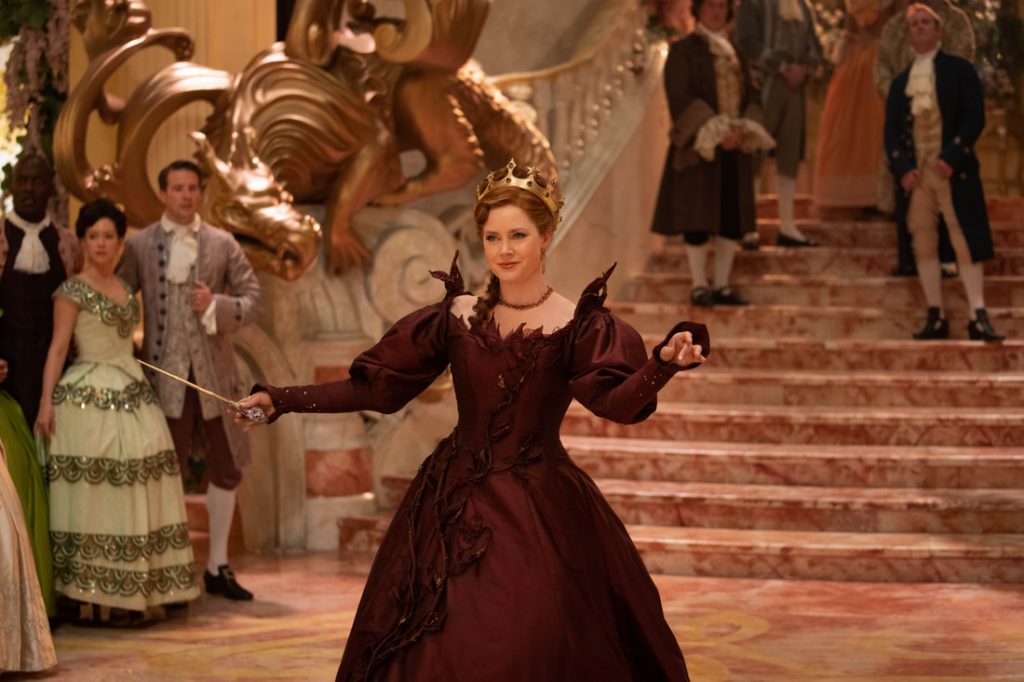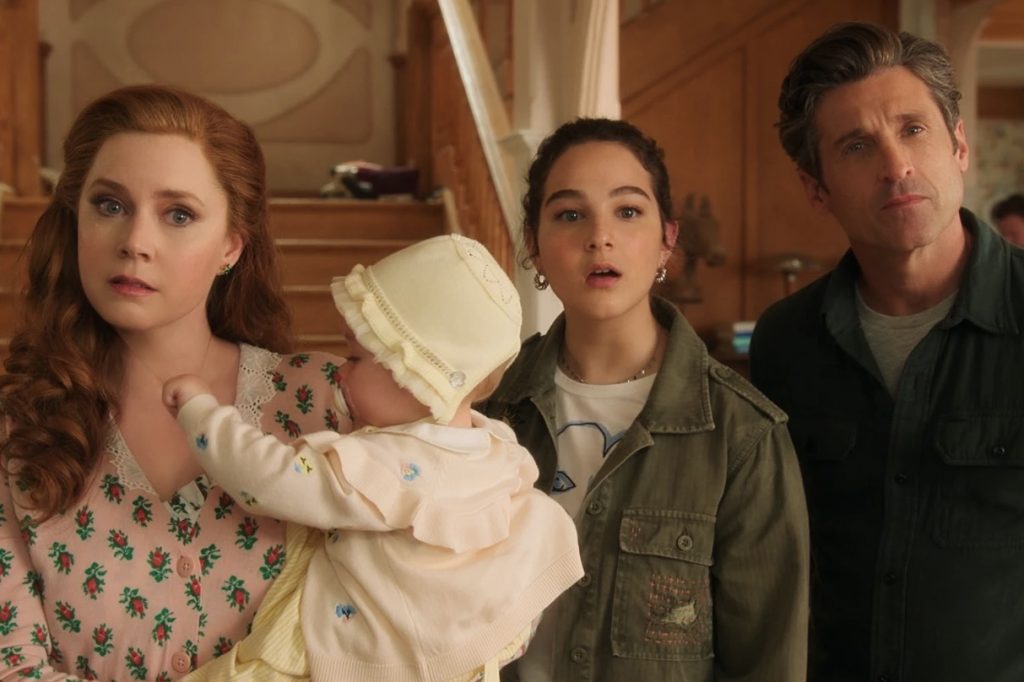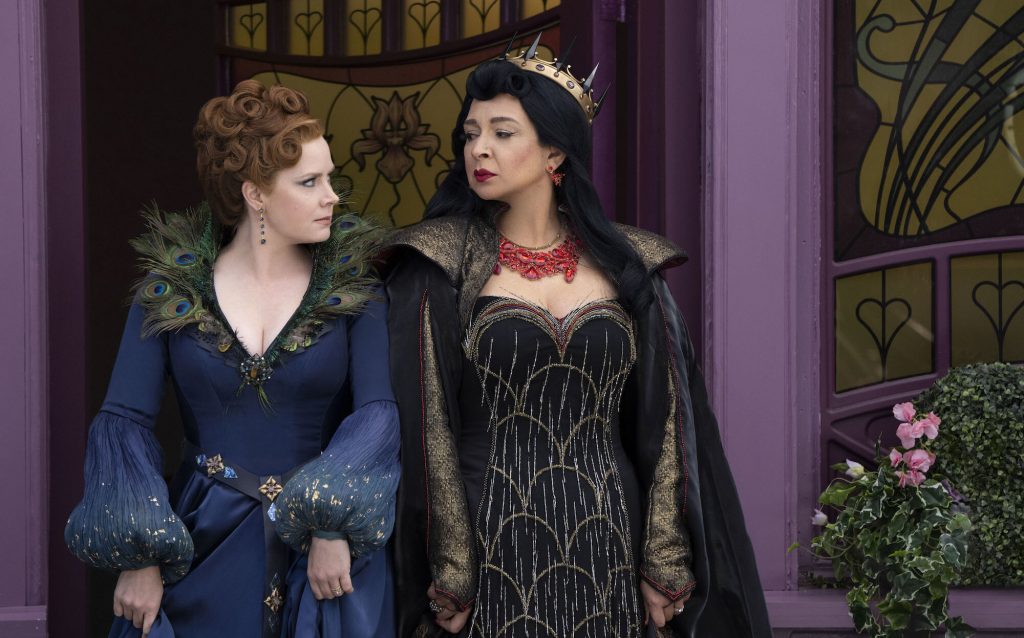Once upon a time, joking about fairytale logic in Disney princess movies was the fresh thing to do. The Disney fairytale is a known formula: a noble female protagonist achieves her dream or is delivered from harm thanks to her inherent goodness, despite the machinations of a one-dimensional villain, in a story involving magic of some sort. This formula has held true since the company’s very first feature film, Snow White and the Seven Dwarfs (1937), until the Disney Renaissance of the nineties offered the first releases whose fantasy elements weren’t played completely straight. Aladdin (1992) and Hercules (1997), for example, are rife with pop culture references and riffs on fairytale conventions. With this precedent established, 2007’s Enchanted dialled up the irreverence to comedic effect with its premise of transplanting a stereotypical princess to New York City, explicitly contrasting fairytale logic with a real-world setting.

In Disenchanted, the sequel released last month on Disney+, the approach of judging fantasy norms by conventional logic is all but gone—an interesting move, given that recent trends have been against straightforward fairytale stories. Many of the company’s releases in the new millennium have had nothing to do with fairytales (The Incredibles (2004), Wreck-It Ralph (2012), and Zootopia (2016), among others). The films that do follow the fairytale formula include self-aware jokes about the conventions of the genre, or attempt botched subversions of them. The princess format is getting old, and Disney knows it. But with their surefire appeal to a young audience, infinite merchandising potential, and history as the company’s foundation, princess movies will likely be rolled out for a long time yet.
With Disenchanted, Disney has found a way to make fairytales interesting once again, without attacking the genre as many newer films do; the movie wholeheartedly commits to its fantasy premise but approaches it from a new angle. Disenchanted finds Princess Giselle growing dissatisfied with her life in the real world, eventually making a wish that imposes the fairytale framework on her new neighbourhood, with disastrous results. Giselle’s actions leading up to her transformation into an evil stepmother are well-intentioned but selfish, which gives her a dimensionality that many Disney princesses lack. Her family has to move away from their New York City apartment because of her new baby, but she chooses a neighbourhood that is as similar to a fairytale town as possible, despite her husband and stepdaughter’s desire to live closer to the city. In her attempts to help her stepdaughter Morgan fit in at a new school, Giselle intrudes on Morgan’s need for agency and the existing town planning hierarchy. And when Giselle realizes that her family is unhappy in their new home, she wishes for a fairytale life. This solution might suit her, but it’s not ideal for her practical husband, cynical stepdaughter, or the townspeople who must now fend off attacks from dragons and giants. Here, the conflict is not a search for the protagonist’s dream of beauty or adventure or exotic locales but the main character behaving inconsiderately and having to make amends. The ensuing quest to undo her wish still includes enough classical elements to make it a recognizable fairytale, so this change is not an attack on the fairytale structure itself, and it adds a complex moral dimension where the genre usually takes a cut-and-dry approach to good and evil.

Apart from this small change, Disenchanted is happy to follow the fairytale format because its character-driven core is innovative enough to make the story feel new. The film leaves the more essential fairytale elements alone, unlike other recent Disney princess stories that aim to innovate by half-heartedly subverting fairytale norms. For example, Frozen’s twist villain feels out of place because the movie otherwise follows a conventional format; it would have worked better had the story been more critical of fairytales overall. In order to have a consistent tone, a princess story should either adhere to the genre rules or throw them out entirely. Disenchanted takes the former approach, with a story that fits easily within the conventional structure. Giselle’s wish doesn’t come true to her liking, not because of some device uncharacteristic of fairytales, but by her lack of foresight about its consequences. When Giselle wishes for a fairytale life, all the people and places around her are slotted into archetypical fairytale roles. Her stepdaughter Morgan’s youth and desire for self-actualization make her an obvious fit for the role of princess, but Giselle fails to realize that under this casting, she is stepmother to a princess—which is, of course, a villainous role. In this way, events naturally arise from the application of fairytale rules, not through their subversion.
Significantly, Disenchanted doesn’t break the audience immersion by pointing out the artifice of the plot. No other recent release seems to be free of self-deprecating meta-references to the fairytale template. A character in Frozen (2013) expresses disbelief that Princess Anna is in love with a man she has only known for one day, and Moana (2016) quips that “if you wear a dress and have an animal sidekick, you’re a princess.” Jokes like these were novel in the nineties, but after thirty years, they’re tonally dissonant. Movies with wry observations on fairytale logic end up breaking the audience’s suspension of disbelief, only to continue abiding by the very logic they critique. Enchanted resolves this issue by never asking for suspension of disbelief in the first place, acknowledging upfront that Princess Giselle’s naive outlook—the movie’s source of comedy—is fantastical. Disenchanted simply avoids this type of joke altogether. Unaware that they are under a spell, the residents of Fiselle’s enchanted neighbourhood don’t think fairytale tropes are strange, leaving no one self-aware enough to deliver meta-jokes like the ones in Frozen and the original Enchanted. As a result, Disenchanted is free to fully devote itself to a fairytale plot, using it to explore themes like the relationship between Giselle and Morgan, and the evils of acting thoughtlessly. At a time when Disney movies are too ironic to commit to the fairytale approach, a story can be fresh just by engaging genuinely with a fairytale premise.

Disenchanted inverts the premise of its predecessor while remaining faithful to the inventiveness of Enchanted; the former applies fairytale rules to the real world while the latter makes fairytales accountable to real-world logic. When the only princess stories being released don’t seem to like the fact that they are princess stories, what is needed is a princess story that does not disown its heritage but looks for new ways of working within its genre instead.
